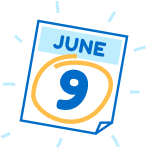
Disc golf proves to be a prescription for Young Onset Dementia
By John McCaffery
Did you know that people in their 40s and 50s can have dementia?
Just over eleven years ago, at age 48, I was a typical busy dad. My two children and I enjoyed many hours together cycling, taking martial arts classes, playing badminton and going on surprise adventures to the mountains.
My career was in full swing and I volunteered as a Rotarian, soccer coach and paddler in dragon boat fundraisers. But one day my martial arts instructor approached me after class, mentioned that I wasn’t completing the sparring sequences correctly and wondered why I overlooked some steps.
Around the same time my manager at work expressed concern that I was missing important details in my paperwork and did poorly learning new software. One summer day I went home after work and told my wife Cindy, “I can’t figure it out anymore.”
Together we began a long series of doctors’ visits, lab tests, CT and MRI scans, and “second” opinions. Two days of neuropsychological testing showed that I had mild cognitive impairment, probably due to a neurodegenerative disease.
My brain was slow at processing information and my executive functioning was impaired, making it impossible for me to continue working. A neurologist signed my application for long-term disability and told me to return in six months for more testing.
Diagnosing dementia takes time; doctors need to follow the progression of decline in a patient’s daily activities to determine which of the hundreds of types of dementia a patient has. Further testing and a PET scan showed the frontotemporal lobes in my brain were not processing glucose correctly and I was given the diagnosis of young onset frontotemporal dementia.
Missing the routine of going to work and its social network, I realized I needed more activities to fill my days. I knew that just because I have dementia doesn’t mean that I should stop being active. In fact, I felt better getting out of the house and into the sunshine and fresh air.
Not one to be cooped up indoors, I decided to try disc golf. I found this new activity to be the perfect hobby as it doesn’t require a great investment of equipment or time, and doesn’t have rigid tee times.
Discs cost around $25 and although you’d like to have a putter, a driver and one for mid-range, you can still play a decent game with just one disc. It takes just 1 ½ – two hours to play eighteen holes and there are numerous free public courses in Calgary to choose from.
I like that if I’m feeling foggy I can still go out and play on my own, or if I’m having a good day, I’ll play with a group. The disc golf community is supportive and we enjoy each other’s company. I learned the game quickly and have even won several tournaments in my division (Grand Masters 50+).
I no longer cycle or paddle a dragon boat, but disc golf is an activity that I can do. It’s relaxing for my brain, and I find great pleasure getting out of the house and working on my game.
One of my neurologists was pleased to hear that I learned to play disc golf after my diagnosis of brain disease, proving that people with dementia are capable of learning new things.
As of January 1, 2019 I have played disc golf 617 days in a row and don’t intend on breaking this streak. I’ve played in 130 kph winds, pouring rain, and -24° snowy days, but Cindy says I still come home smiling.
The sunshine, fresh air and brisk walk add up to a prescription for wellness. Cindy notices and appreciates an improvement in my mood after just a couple hours of disc golf which is win-win for us. As the saying goes, “Happy wife – happy life!’
John McCaffery sits on the Boards of Directors and is a member of YouQuest. YouQuest is a wellness community where people with young onset dementia enjoy an active and rewarding quality of life.
YouQuest’s Mission is to “Promote the health and well-being of individuals with young onset dementia and their families by ensuring access to recreation therapy, counselling, and peer support resources.”
For more information about YouQuest and their initiatives please contact Cindy McCaffery or Myrla Bulman at info@youquest.ca




Bravo John!
And I add my bravo….a well written and persuasive piece. Keep on tossing (or throwing??)
Happy New Year
Hello everybody, here every person is sharing such experience,
therefore it’s good to read this weblog, and I used to pay a visit this website daily.
Thanks for commenting!! We hope you continue to enjoy the site.